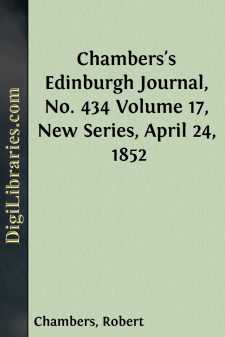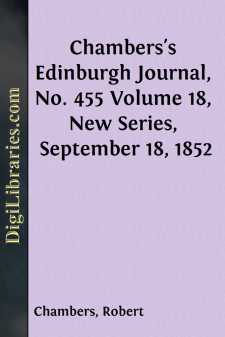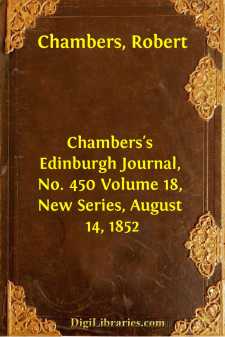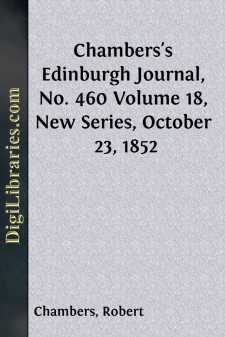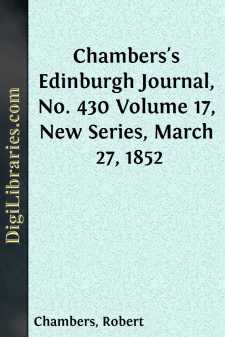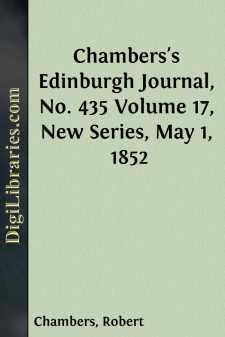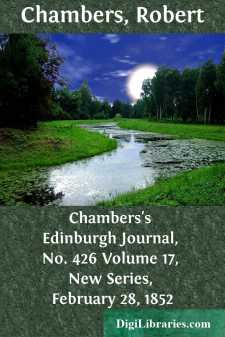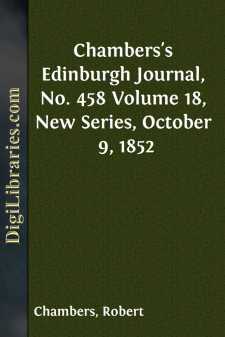Categories
- Antiques & Collectibles 13
- Architecture 36
- Art 48
- Bibles 22
- Biography & Autobiography 813
- Body, Mind & Spirit 142
- Business & Economics 28
- Children's Books 15
- Children's Fiction 12
- Computers 4
- Cooking 94
- Crafts & Hobbies 4
- Drama 346
- Education 46
- Family & Relationships 57
- Fiction 11828
- Games 19
- Gardening 17
- Health & Fitness 34
- History 1377
- House & Home 1
- Humor 147
- Juvenile Fiction 1873
- Juvenile Nonfiction 202
- Language Arts & Disciplines 88
- Law 16
- Literary Collections 686
- Literary Criticism 179
- Mathematics 13
- Medical 41
- Music 40
- Nature 179
- Non-Classifiable 1768
- Performing Arts 7
- Periodicals 1453
- Philosophy 64
- Photography 2
- Poetry 896
- Political Science 203
- Psychology 42
- Reference 154
- Religion 513
- Science 126
- Self-Help 84
- Social Science 81
- Sports & Recreation 34
- Study Aids 3
- Technology & Engineering 59
- Transportation 23
- Travel 463
- True Crime 29
Chambers's Edinburgh Journal, No. 418 Volume 17, New Series, January 3, 1852
by: Robert Chambers
Description:
Excerpt
A CHILD'S TOY.
The afternoon was drawing in towards evening; the air was crisp and cool, and the wind near the earth, steady but gentle; while above all was as calm as sleep, and the pale clouds—just beginning in the west to be softly gilded by the declining sun—hung light and motionless. The city, although not distant, was no longer visible, being hidden by one of the many hills which give such enchantment to the aspect of our city. There was altogether something singularly soothing in the scene—something that disposed not to gravity, but to elevated thought. As we looked upwards, there was some object that appeared to mingle with the clouds, to form a part of their company, to linger, mute and motionless like them, in that breathless blue, as if feeling the influence of the hour. It was not a white-winged bird that had stolen away to muse in the solitudes of air: it was nothing more than a paper kite.
On that paper kite we looked long and intently. It was the moral of the picture; it appeared to gather in to itself the sympathies of the whole beautiful world; and as it hung there, herding with the things of heaven, our spirit seemed to ascend and perch upon its pale bosom like a wearied dove. Presently we knew the nature of the influence it exercised upon our imagination; for a cord, not visible at first to the external organs, though doubtless felt by the inner sense, connected it with the earth of which we were a denizen. We knew not by what hand the cord was held so steadily. Perhaps by some silent boy, lying prone on the sward behind yonder plantation, gazing up along the delicate ladder, and seeing unconsciously angels ascending and descending. When we had looked our fill, we went slowly and thoughtfully home along the deserted road, and nestled as usual, like a moth, among our books. A dictionary was lying near; and with a languid curiosity to know what was said of the object that had interested us so much, we turned to the word, and read the following definition: Kite—a child's toy.
What wonderful children there are in this world, to be sure! Look at that American boy, with his kite on his shoulder, walking in a field near Philadelphia. He is going to have a fly; and it is famous weather for the sport, for it is in June—June 1752. The kite is but a rough one, for Ben has made it himself, out of a silk-handkerchief stretched over two cross-sticks. Up it goes, however, bound direct for a thunder-cloud passing overhead; and when it has arrived at the object of its visit, the flier ties a key to the end of his string, and then fastens it with some silk to a post. By and by he sees some loose threads of the hempen-string bristle out and stand up, as if they had been charged with electricity. He instantly applies his knuckle to the key, and as he draws from it the electrical spark, this strange little boy is struck through the very heart with an agony of joy. His labouring chest relieves itself with a deep sigh, and he feels that he could be contented to die that moment....



